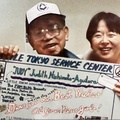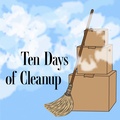Chapter 11 >>
Carlos Yamashita’s favorite Japanese superhero was Kikaider. Half blue and half red, Kikaider was a humanoid robot created to save the world from a mad scientist, Professor Gill. Carlos regularly watched old Japanese Kikaider live-action programs broadcast on cable in Paraguay. One of his friends also brought back manga and cartoons of Kikaider from his family’s summer trips to Japan. They spent hours eating rice crackers and talking about the various cartoon panels that had the best action.
“Chaaaange. Chaaaange. Switch on, one, two, three,” then a normal looking Japanese young man, Jiro, would turn into Kikaider. Kikaider, who was constantly warring between his good side (blue) and bad side (red), then leapt and did somersaults in the air before disarming enemies and even sometimes fire. Sometimes the evil Dr. Gill would blow on his flute that controlled the bad robots and the red side of Kikaider. But in the end, Kikaider was able to ward off Dr. Gill’s signal and do good.
So when Carlos saw his great-grandfather point his Glock at the woman as she ran to free the man on the stairs of the Watsonville house, he knew that he had to do something. Bisabuelo, the great-grandfather whom Carlos loved, was somehow turning into Professor Gill. And Carlos, like Kikaider, felt the blue and red halves of him in conflict. But no more. Kikaider then jumped forward, his arms extended, his hands together, as if he were going to take a jump into a pool. Kikaider was strong, he could withstand anything. So when Carlos felt the flash of pain on his side, he was surprised. Why was he on the ground? And why were all these strangers crowded around him?
* * *
“Carlos—” Jorge stumbled forward away from the truck. His head felt cloudy and heavy, but he still knew what he had seen long-distance. It didn’t matter that it was in the middle of the night. The full moon served as a spotlight. There was no question that his boy had just been shot by his great-grandfather, Saburo Shishido.
“Carlos,” Jorge pushed aside his boss, Bob, Bob’s wife Alex, and their daughter-in-law, Sayuri. A dark-skinned Japanese woman who seemed to know something about medicine remained kneeling beside Carlos. “I think the bullet went straight through him,” she said in Spanish. “I don’t think it touched his heart, but it could have damaged some other organs.”
Jorge didn’t even react upon hearing his native Spanish. All he cared about his son.
“Call 9-1-1, someone,” said Juanita. “We need to stop the bleeding. Does anyone have a long piece of clothing?” Everyone quickly brought out what they could. Bob’s belt. Alex’s scarf. Juanita wrapped the boy as tight as she could so he looked like a Native American papoose.
Jorge whispered his boy’s ear. “It’s going to be alright, Carlos. Just gambatte.” Carlos knew that Japanese word. Persevere. Jorge kept repeating it, as if it were a magic talisman that would sustain his boy’s life.
All this time Saburo stayed silent in his wheelchair. He had thrown the Glock down to the ground as soon as he had realized that he had shot Carlos instead of Sayuri.
Soon they heard the wail of the ambulance, and Jorge rose. “Why? Why, Abuelo, why? Why would you do such a thing?” he asked the old man. His voice was not harsh or angry. Almost resigned. As if the answer didn’t matter.
“I loved her. I really did,” he said in English.
“Who? What are you talking about?”
“Itsuko.”
Both Juanita and Sayuri looked up, stunned. Itsuko—that was the name of the Japanese Canadian old woman who had died from strawberry poisoning.
“She laughed at me when I said that I could do great things with the strawberry. So I thought to send her some deadly strawberries to remind her what she had done to me. She poisoned my heart. She broke it.”
Jorge frowned. “I do not know what you are saying.”
The ambulance drove into the dirt driveway and Jorge returned back to his son. The paramedics moved Carlos onto a stretcher. “Are you the boy’s father?” they asked Jorge.
Jorge nodded.
“C’mon on in, then.”
Jorge got into the back of the ambulance. As they sped out, Jorge heard more sirens. From the ambulance’s rear window, he saw a line of black-and-white police cars, their red lights flashing, drive towards the Watsonville house.
* * *
Haru snuck into her Uncle Sab’s grand Victorian home through the unlocked kitchen door. It was full moon and even though it was night, Haru could clearly see that her uncle’s Model T truck was not in the driveway. This was her chance to retrieve the Nihongo textbook and save Papa’s formula for the best strawberry ever created.
Where would he have kept the book? The light of the moon shone clearly into the windows, which lacked any covering like curtains. She looked for the book’s red cover on the dining room table. Nothing except for a lace doily. Uncle Sab kept the house immaculate. Haru had heard that most single men were a mess, but her uncle was meticulous. Haru had heard some men in the general store in downtown Watsonville say that Uncle Sab’s memory was like an elephant’s. He remembered every grudge, every unkind word. Haru felt that Uncle Sab was hanging onto something now—maybe related to that woman he was supposedly married to? She wasn’t sure.
Maybe the book was upstairs in his bedroom. Or maybe the library. Uncle Sab had lots of books in the library. Many of them were on science and botany, his expertise. But maybe there would be a red book on Japanese as well.
Haru crept up the wooden staircase. While well-maintained, they still creaked as she put weight on each step. Haru then heard a noise and a ball of yellow fur came down towards her. Tamago-chan! Uncle Sab’s fat yellow cat. Haru bent down to pet her, but the cat ran back upstairs.
Haru’s heart pounded hard, almost shaking her thin frame. She wore a cotton dress, practically the only piece of clothing she owned. Once a week, Mama would wash the dress and Haru had to stay inside in her underwear.
Noises again. “Tamago-chan,” Haru called out. Did the cat disappear in Uncle Sab’s library? The door was half ajar and Haru looked in. She stepped back. It was Uncle Sab, sitting at his desk, his back turned to her. Haru was going to run down the stairs, but was there something wrong with Uncle Sab. He was making awful coughing sounds and his head was in his hands.
“Uncle Sab, are you alright?” whispered Haru, her reed-like legs trembling.
Uncle Sab turned and his face was swollen with tears. Haru could see her textbook on the desk.
The man didn’t say anything for a while. He didn’t even seem surprised to see his young niece in his house at the middle of the night. Through the window the moon cast a strange light on the textbook, which was open to the page where Papa had written his special strawberry formula.
“Everything I have touched has escaped or died.”
Haru didn’t understand but she felt scared. What had died? What could Uncle Sab possibly be talking about? “I’m here for my book. Can I have my textbook back?”
Uncle Sab hesitated and then handed the textbook to Haru. She noticed something new on Papa’s page. “Poison,” she could read in Japanese. Just seeing those words suddenly erased Haru’s fear. “Doku? Why did you write such a thing? Why are you trying to ruin Papa’s formula?”
“Poison. That’s what I am. Poison.”
Haru didn’t know whether to believe Uncle Sab. This might be a trick for her to feel sorry for him. He seemed repentant about something. But to repent meant he must have done something wrong.
“I have to go home.” She hugged the textbook to her chest, as if it might somehow protect her heart. The moon seemed to follow her in the room, casting light on the cover of the book, which was bright red, the color of fresh blood.
Uncle Sab gazed back at the sky. “Full moon,” he said. “Do you know the tale about the rabbit in the moon?”
Haru shook her head. One part of her wanted to run down the stairs, out of the house. But another part of her wanted to stay to hear the story.
“Three animals wanted to make the ultimate sacrifice to an old beggar. A monkey. A fox. A rabbit. The monkey brought fruit. A fox brought fish. But the rabbit had nothing. So it was going to jump into the fire to sacrifice itself. But the old beggar stopped him. He was actually the man in the moon and took the rabbit up to the moon with him.”
Haru, still clutching the book, breathed hard. Did Uncle Sab want her to jump into fire?
“One day this house will burn. This whole family will burn. But I will be safe. Safe with my daughter.”
Daughter? Haru thought to herself. Uncle Sab didn’t have a daughter. “Nothing is going to happen to Papa and Mama and Kei. None of us. We have Papa’s strawberry formula. He’s going to make the best strawberries in the world.”
Uncle Sab started to make a hacking sound and Haru first thought that he might have been crying again. His mouth, however, was in a jack-o-lantern grin. “You are so young. So naïve.”
“I’m going to tell everyone that you have a plan to hurt them.”
Uncle Sab began laughing again. “No one will believe you.”
“Yes, they will. Yes, they will!” Haru tore out of the room, down the stairs, and almost stepped on Tamago as she left the house.
The moon seemed to be following Haru in her worn cotton dress, the red book held at her heart. Uncle Sab is all about hate, Haru thought. Not about love.
* * *
Sayuri watched as Jorge paced through the hospital waiting room. The wait was excruciating for all of them. The boy had to be okay. Just had to be.
It was strange for Sayuri to think that they were all family. Jorge and Carlos Yamashita. Perhaps the Japanese Canadian woman Phyllis Hamakawa. And even the crazy old man, Saburo Shishido. The police didn’t even bother to handcuff Saburo as they took him away in the squad car. What was the use? The little fight that Saburo had was all gone when the old man realized that he might have killed his great-grandson.
That is what this was all about, Sayuri thought, as she looked over to her in-laws seated across from them. Family, both good and bad. She now felt ashamed about not telling her own mother in Japan the truth about Greg’s return to the family farm. What was the haji in it? It was a powerful profession, powerful enough for someone to want to kill for it.
Two surgeons wearing green gowns walked into the waiting room.
“Mr. Yamashita?” one of them asked.
Jorge walked over to them, his knees shaking. The three of them conversed privately and then Jorge turned to the rest of the family. “He live,” he said in English. And then adding in Japanese. “Daijyobu.”
Sayuri exhaled and hugged Greg, who had been given a clean bill of health hours earlier. He was ragged and bruised up a little. But he’d live as well.
“This is good news,” Greg said.
Sayuri had to agree. Very good news indeed.
* * *
Haru burst into her family’s shack and both Papa and Mama rose from the table. “We were so worried about you, Haru,” Mama said. “Never leave the house without telling us.”
“I got the book back, Papa.” Haru held the textbook above her head.
“You went to Uncle Saburo’s house.” Papa frowned.
“He said that he was going hurt us. That we were going to burn.”
Papa knelt down and looked into his daughter’s eyes. “Nothing is going to happen to us. Because we have ‘kokoro’. Heart. No matter what we will face in the years to come, we will still stay together. Understand, Haru-chan?”
Haru nodded. That night she slept with the Nihongo book beside her on the pillow. The book fell open to the title page with the circle and the thirteen stars around it. As the moonlight burned onto the pages, the circle seemed to rise and the thirteen stars began to move, rotating slowly and then faster and faster, as if they knew nothing about space or time, nothing about the rules of the universe. Instead they were controlled by a child’s faith, her belief that her family would be someday be unified, made whole—or at least as whole as it could be—through the magic of the Nihongo papers.
THE END
* “The Nihongo Papers” is a work of fiction. The characters, incidents, and dialogue are drawn from the author’s imagination and are not to be construed as real. Any resemblance to actual events or persons, living or dead, is entirely coincidental.
© 2008 Naomi Hirahara





